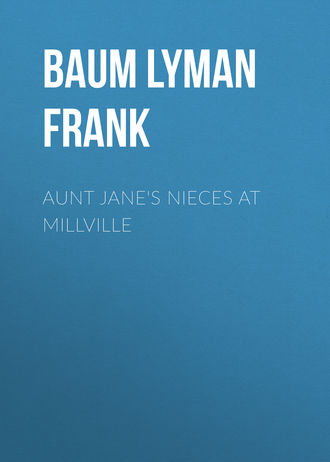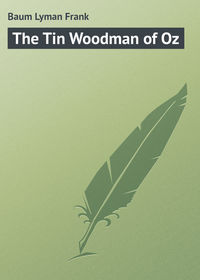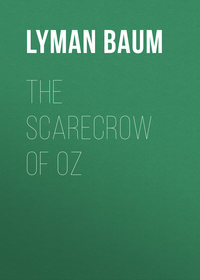 полная версия
полная версияAunt Jane's Nieces at Millville
"Oh, yes; do tell!" pleaded Louise. "We're so anxious to know."
"I don't s'pose it's right clever to pick an' choose when ye're all by," said Skim, regaining confidence. "But ma, she 'lowed thet with three gals handy I orter git one on 'em, to say the least."
"If you got more than one," remarked Beth, calmly, "it would be illegal."
"Oh, one's enough," said Skim, with a grin. "Peggy says it's too many, an' a feller oughtn't to take his gal out'n a grab-bag."
"I should think not, indeed," returned Patsy. "But here are three of us openly displayed, and unless you turn us all down as unworthy, it will be necessary for you to make a choice."
"What foolishness are you girls up to now?" demanded Uncle John, catching a stray word from the other corner while engaged in a desperate struggle with the Major.
"This is a time for you to keep quiet, Uncle," retorted Patsy, merrily. "We've got important things to consider that are none of your affairs, whatever."
Skim reflected that he didn't want this one, except as a last resort.
She was "too bossy."
"When I started out," he said, "I jest come a-courtin', as any feller might do thet wasn't much acquainted. But ef I've got to settle down to one o' ye – "
He hesitated.
"Oh, you must really take one at a time, you know," asserted Louise.
"It's the only proper way."
"Then I'll start on thet dark-eyed one thet's a sewin'," he said, slowly.
Beth looked up from her work and smiled.
"Go ahead, Mr. Clark," she said, encouragingly. "My name is Beth. Had you forgotten it?"
"Call me Skim," he said, gently.
"Very well, Skim, – Now look here, Patsy Doyle, if you're going to sit there and giggle you'll spoil everything. Mr. Clark wants to court, and it's getting late."
"P'raps I've went fur enough fer tonight," remarked Skim, uneasily.
"Next time they'll leave us alone, an' then – "
"Oh, don't postpone it, please!" begged Beth, giving the boy a demure glance from her soft brown eyes. "And don't mind my cousins. I don't."
"These things kain't be hurried," he said. "Si Merkle courted three weeks afore he popped. He tol' me so."
"Then he was a very foolish man," declared Patsy, positively. "Just look at Beth! She's dying to have you speak out. What's the use of waiting, when she knows why you are here?"
By this time Skim had been flattered to the extent of destroying any stray sense he might ever have possessed. His utter ignorance of girls and their ways may have been partly responsible for his idiocy, or his mother's conviction that all that was necessary was for him to declare himself in order to be accepted had misled him and induced him to abandon any native diffidence he might have had. Anyway, the boy fell into the snare set by the mischievous young ladies without a suspicion of his impending fate.
"Miss Beth," said he, "ef yer willin', I'll marry ye; any time ye say. I agreed t' help Dick Pearson with the harvestin', but I'll try to' git Ned Long to take my place, an' it don't matter much, nohow."
"But I couldn't have you break an engagement," cried Beth, hastily.
"Why not?"
"Oh, it wouldn't be right, at all. Mr. Pearson would never forgive me," she asserted.
"Can't ye – "
"No; not before harvest, Skim. I couldn't think of it."
"But arterward – "
"No; I've resolved never to marry after harvest. So, as you're engaged, and I don't approve of breaking engagements, I must refuse your proposition entirely."
Skim looked surprised; then perplexed; then annoyed.
"P'raps I didn't pop jest right," he murmured, growing red again.
"You popped beautifully," declared Patsy. "But Beth is very peculiar, and set in her ways. I'm afraid she wouldn't make you a good wife, anyhow."
"Then p'raps the gal in blue – "
"No;" said Louise. "I have the same prejudices as my cousin. If you hadn't been engaged for the harvest I might have listened to you; but that settles the matter definitely, as far as I am concerned."
Skim sighed.
"Ma'll be mad as a hornet ef I don't get any of ye," he remarked, sadly. "She's paid Sam Cotting fer this courtin' suit, an' he won't take back the gloves on no 'count arter they've been wore; an' thet'll set ma crazy. Miss Patsy, ef yo' think ye could – "
"I'm sure I couldn't," said Patsy, promptly. "I'm awfully sorry to break your heart, Skim, dear, and ruin your future life, and make you misanthropic and cynical, and spoil your mother's investment and make her mad as a hornet. All this grieves me terribly; but I'll recover from it, if you'll only give me time. And I hope you'll find a wife that will be more congenial than I could ever be."
Skim didn't understand all these words, but the general tenor of the speech was convincing, and filled him with dismay.
"Rich gals is tarnal skeerce in these parts," he said, regretfully.
Then they gave way again, and so lusty was the merriment that Uncle John and the Major abandoned their game and came across the room to discover the source of all this amusement.
"What's up, young women?" asked their Uncle, glancing from their laughing faces to the lowering, sullen one of the boy, who had only now begun to suspect that he was being "poked fun at."
"Oh, Uncle!" cried Patsy; "you've no idea how near you have been to losing us. We have each had an offer of marriage within the last half hour!"
"Dear me!" ejaculated Uncle John.
"It shows the young man's intelligence and good taste," said the Major, much amused. "But is it a Mormon ye are, sir, to want all three?" directing a keen glance at Skim.
"Naw, 'tain't," he returned, wholly disgusted with the outcome of his suit. "All three got as't 'cause none of 'em's got sense enough t' know a good thing when they seen it."
"But I do," said the Major, stoutly; "and I maintain that you're a good thing, and always will be. I hope, sir, you'll call 'round and see me in Baltimore next year. I'll not be there, but ye can leave your card, just the same."
"Please call again, sir," added Uncle John; "about October – just before snow flies."
The boy got up.
"I don't keer none," he said, defiantly. "It's all ma's fault, gittin' me laughed at, an' she won't hear the last of it in a hurry, nuther."
"Be gentle with her, Skim," suggested Beth, softly. "Remember she has to face the world with you by her side."
Having no retort for this raillery, which he felt rather than understood, Skim seized his hat and fled. Then Patsy wiped the tears from her eyes and said:
"Wasn't it grand, girls? I haven't had so much fun since I was born."
CHAPTER XXI.
THE TRAP IS SET
Uncle John was forced to acknowledge to his nieces that his boast to unmask Bob West within three days was mere blustering. If he accomplished anything in three weeks he would consider himself fortunate. But he had no wish to conceal anything from the girls, so he told them frankly of his interview with the hardware merchant, and also what Joe Wegg had said about the stock in the locked cupboard. They were, of course, greatly interested in this new phase of the matter and canvassed it long and eagerly.
"The man is lying, of course," said Patsy, "for Captain Wegg and poor Mr. Thompson could not transfer their stock to West after that fatal night when he brought to them the news of the fire."
"I believe the stock is still in this cupboard," declared Uncle John.
"Unless West stole the keys and has taken it away," suggested Louise.
"I'm sure he did not know about the secret drawer," said her uncle. "Probably he stole the keys and searched the cupboard; if he had found the stock he would have left the keys, which would then be of no further use to him. As he did not find the stock certificates, he carried the keys away, that he might search again at his leisure. And they've never yet been returned."
"Why, John, ye're possessed of the true detective instinct," the Major remarked, admiringly. "Your reasoning is at once clever and unassailable."
"I wonder," mused Beth, "if we could tempt Mr. West to come again to search the cupboard."
"He will scarcely venture to do that while we are here," replied Uncle
John.
"I said 'tempt him,' Uncle."
"And what did you mean by that expression, Beth?"
"I'll think it over and tell you later," she returned, quietly.
*****Ethel Thompson would have shown Joe Wegg how much she resented his leaving Millville without a word to her, had she not learned from Mr. Merrick the boy's sad condition. Knowing her old friend was ill, she determined to ignore the past and go to him at once, and Uncle John knew very well there would be explanations to smooth away all the former misunderstandings.
Joe was now aware of the fact that his letter to Ethel had never reached its destination, so, as soon as the girl had arrived and the first rather formal greetings were over, he sent Kate Kebble to McNutt's to ask the agent to come over to the hotel at once.
The girl returned alone.
"Peggy says as he can't come," she announced.
"Why not?" asked Joe.
"Says he's jest painted his off foot blue an' striped it with red, an' it hain't dried yit."
"Go back," said Joe, firmly. "Tell Peggy he's in trouble, and it's likely to cost him more than a new coat of paint for his foot if he doesn't come here at once."
Kate went back, and in due time the stump of McNutt's foot was heard on the stairs. He entered the room looking worried and suspicious, and the stern faces of Ethel and Joe did not reassure him, by any means. But he tried to disarm the pending accusation with his usual brazen impertinence.
"Nice time ter send fer me, this is, Joe," he grumbled. "It's gittin' so a feller can't even paint his foot in peace an' quiet."
"Peggy," said Joe, "when I went away, three years ago, I gave you a letter for Miss Ethel. What did you do with it?"
Peggy's bulging eyes stared at his blue foot, which he turned first one side and then the other to examine the red stripes.
"It's this way, Joe," he replied; "there wa'n't no postige stamp on the letter, an' Sam Cotting said it couldn't be posted no way 'thout a stamp."
"It wasn't to be sent through the post-office," said the boy. "I gave you a quarter to deliver it in person to Miss Ethel."
"Did ye, Joe? did ye?"
"Of course I did."
"Cur'ous," said McNutt, leaning over to touch the foot cautiously with one finger, to see if the paint was dry.
"Well, sir!"
"Well, Joe, there's no use gittin' mad 'bout it. Thet blamed quarter ye giv me rolled down a crack in the stoop, an' got lost. Sure. Got lost as easy as anything."
"Well, what was that to me?"
"Oh, I ain't blamin' you," said Peggy; "but 'twere a good deal to me, I kin tell ye. A whole quarter lost!"
"Why didn't you take up a board, and get it again?"
"Oh, I did," said McNutt. cheerfully. "I did, Joe. But the money was all black an' tarnished like, by thet time, an' didn't look at all like silver. Sam he wouldn't take it at the store, so my ol' woman she 'lowed she'd polish it up a bit. Ye know how sort o' vig'rous she is, Joe. She polished that blamed quarter the same way she jaws an' sweeps; she polished it 'til she rubbed both sides smooth as glass, an' then Sam wouldn't take it, nuther, 'n' said it wasn't money any more. So I drilled two holes in it an' sewed it on my pants fer a 'spender butt'n."
"But why didn't you deliver the letter?"
"Did ye 'spect I'd tramp way t' Thompson's Crossing fer nuthin'?"
"I gave you a quarter."
"An' it turned out to be on'y a 'spender butt'n. Be reason'ble, Joe."
"Where is the letter?"
"'Tain't a letter no more. It's on'y ol' fambly papers by this time.
Three years is – "
"Where is it? By thunder, Peggy, if you don't answer me I'll put you in jail for breach of trust!"
"Ye've changed, Joe," sadly. "Ye ain't no more like – "
"Where is it?"
"Behind the lookin'-glass in my sett'n-room."
"Go and get it immediately, sir!"
"Ef I hev to cross thet dusty road twic't more, I'll hev to paint all over agin, an' thet's a fact."
"Ethel," said Joe, with the calmness of despair, "you'll have to telephone over to the Junction and ask them to send a constable here at once."
"Never mind," cried McNutt, jumping up hastily; "I'll go. Paint don't cost much, nohow."
He stumped away, but on his return preferred to let Kate carry the soiled, torn envelope up to the young folks. The letter had palpably been tampered with. It had been opened and doubtless read, and the flap clumsily glued down again.
But Ethel had it now, and even after three years her sweet eyes dimmed as she read the tender words that Joe had written because he lacked the courage to speak them. "My one great ambition is to win a home for us, dear," he had declared, and with this before her eyes Ethel reproached herself for ever doubting his love or loyalty.
When she rode her pony over to the Wegg farm next day Ethel's bright face was wreathed with smiles. She told her girl friends that she and Joe had had a "good talk" together, and understood each other better than ever before. The nieces did not tell her of their newly conceived hopes that the young couple would presently possess enough money to render their future comfortable, because there were so many chances that Bob West might win the little game being played. But at this moment Ethel did not need worldly wealth to make her heart light and happy, for she had regained her childhood's friend, and his injuries only rendered the boy the more interesting and companionable.
Meantime Uncle John had been busily thinking. It annoyed him to be so composedly defied by a rascally country merchant, and he resolved, if he must fight, to fight with all his might.
So he wired to his agent in New York the following words:
"What part of the Almaquo timber tract burned in forest fire three years ago?"
The answer he received made him give a satisfied grunt.
"No forest fires near Almaquo three years ago. Almadona, seventy miles north, burned at that time, and newspaper reports confounded the names."
"Very good!" exclaimed Uncle John. "I've got the rascal now."
He issued instructions to the lumber company to make no further payments of royalties to Robert West until otherwise advised, and this had the effect of bringing West to the farm white with rage.
"What do you mean by this action, Mr. Merrick?" he demanded.
"We've been paying you money that does not belong to you for three years, sir," was the reply. "In a few days, when my investigations are complete, I will give you the option of being arrested for embezzlement of funds belonging to Joseph Wegg and the Thompsons, or restoring to them every penny of their money."
West stared.
"You are carrying matters with a high hand, sir," he sneered.
"Oh, no; I am acting very leniently," said Uncle John.
"Neither Joe nor the Thompsons own a dollar's interest in the Almaquo property. It is all mine, and mine alone."
"Then produce the stock and prove it!" retorted Mr. Merrick, triumphantly.
At that moment Louise interrupted the interview by entering the room suddenly.
"Oh, Uncle," said she, "will you join us in a picnic to the Falls tomorrow afternoon? We are all going."
"Then I won't be left behind," he replied, smiling upon her.
"We shall take even Thomas and Nora, and come home late in the evening, by moonlight."
"That suits me, my dear," said he.
West stood silent and scowling, but as the girl tripped away she saw him raise his eyes and glance slyly toward the cupboard, for they were in the right wing room.
"Mr. Merrick," he resumed, in a harsh voice; "I warn you that if your company holds up the payment of my royalties it will break the contract, and I will forbid them to cut another tree. You are doubtless aware that there are a dozen firms willing to take your place and pay me higher royalties."
"Act as you please, sir," said Uncle John, indifferently. "I believe you are face to face with ruin, and it won't matter much what you do."
West went away more quietly than he had come, and the girls exclaimed, delightedly:
"The trap is set, Uncle!"
"I think so, myself," he rejoined. "That picnic was a happy thought,
Louise."
Early the next afternoon they started out with hammocks and baskets and all the paraphernalia of a picnic party. The three girls, Nora and Uncle John squeezed themselves into the surrey, while the Major and Old Hucks rode after them in the ancient buggy, with Dan moaning and groaning every step he took. But the old horse moved more briskly when following Joe, and Hucks could get more speed out of him than anyone else; so he did not lag much behind.
The procession entered Millville, where a brief stop was made at the store, and then made its exit by the north road. West was standing in the door of his hardware store, quietly observing them. When they disappeared in the grove he locked the door of his establishment and sauntered in the direction of the Pearson farm, no one noticing him except Peggy McNutt, who was disappointed because he had intended to go over presently and buy a paper of tacks.
When the village was left behind, Uncle John drove swiftly along, following the curve of the lake until he reached a primitive lane that he had discovered formed a short cut directly back to the Wegg farm. Old Thomas was amazed by this queer action on the part of the picnic party, but aside from blind Nora, who had no idea where they were, the others seemed full of repressed eagerness, and in no way surprised.
The lane proved very rocky though, and they were obliged to jolt slowly over the big cobble stones. So Beth and Patsy leaped out of the surrey and the former called out:
"We will run through the forest, Uncle, and get home as soon as you do."
"Be careful not to show yourselves, then," he replied. "Remember our plans."
"We will. And don't forget to tie the horses in the thicket, and warn
Thomas and Nora to keep quiet until we come for them," said Patsy.
"I'll attend to all that, dear," remarked Louise, composedly. "But if you girls are determined to walk, you must hurry along, or you will keep us waiting."
The nieces had explored every path in the neighborhood by this time, so Beth and Patsy were quite at home in the pine forest. The horses started up again, and after struggling along another quarter of a mile a wheel of the surrey dished between two stones, and with a bump the axle struck the ground and the journey was promptly arrested.
"What shall we do now?" asked Uncle John, much annoyed, as the party alighted to examine the wreck.
"Send Thomas back to the village for another wheel" suggested the Major.
"Not today!" cried Louise. "We mustn't appear in the village again this afternoon, on any account. It is absolutely necessary we should keep out of sight."
"True," agreed Uncle John, promptly. "Thomas and Nora must picnic here all by themselves, until nearly midnight. Then they may drive the buggy home, leading Daniel behind them. It will be time enough tomorrow to get a new buggy wheel, and the broken surrey won't be in anybody's way until we send for it."
If Old Hucks thought they had all gone crazy that day he was seemingly justified in the suspicion, for his master left the baskets of good things to be consumed by himself and Nora and started to walk to the farm, the Major and Louise accompanying him.
"We mustn't loiter," said the girl, "for while West may wait until darkness falls to visit the farm, he is equally liable to arrive at any time this afternoon. He has seen us all depart, and believes the house deserted."
But they were obliged to keep to the lane, where walking was difficult, and meantime Patsy and Beth were tripping easily along their woodland paths and making much better progress.
CHAPTER XXII.
CAUGHT
"We're early," said Beth, as they came to the edge of the woods and sighted the farm house; "but that is better than being late."
Then she stopped suddenly with a low cry and pointed to the right wing, which directly faced them. Bob West turned the corner of the house, tried the door of Uncle John's room, and then walked to one of the French windows. The sash was not fastened, so he deliberately opened it and stepped inside.
"What shall we do?" gasped Patsy, clasping her hands excitedly.
Beth was always cool in an emergency.
"You creep up to the window, dear, and wait till you hear me open the inside door," said she. "I'll run through the house and enter from the living-room. The key is under the mat, you know."
"But what can we do? Oughtn't we to wait until Uncle John and father come?" Patsy asked, in a trembling voice.
"Of course not. West might rob the cupboard and be gone by that time.
We've got to act promptly, Patsy; so don't be afraid."
Without further words Beth ran around the back of the house and disappeared, while Patsy, trying to control the beating of her heart, stole softly over the lawn to the open window of Uncle John's room.
She could not help looking in, at the risk of discovery. Bob West – tall, lean and composed as ever – was standing beside the cupboard, the doors of which were wide open. The outer doors were of wood, panelled and carved; the inner ones were plates of heavy steel, and in the lock that secured these latter doors were the keys that had so long been missing. Both were attached to a slender silver chain.
As Patsy peered in at the man West was engaged in deliberately examining packet after packet of papers, evidently striving to find the missing stock certificates. He was in no hurry, believing he would have the house to himself for several hours; so he tumbled Captain Wegg's souvenirs of foreign lands in a heap on the floor beside him, thrusting his hand into every corner of the cupboard in order that the search might be thorough. He had once before examined the place in vain; this time he intended to succeed.
Presently West drew a cigar from his pocket, lighted it, and was about to throw the match upon the floor when the thought that it might later betray his presence made him pause and then walk to the open window. As he approached, Patsy became panic-stricken and, well knowing that she ought to run or hide, stood rooted to the spot, gazing half appealingly and half defiantly into the startled eyes of the man who suddenly confronted her.
So for a moment they stood motionless. West was thinking rapidly. By some error be had miscounted the picnic party and this girl had been left at home. She had discovered his intrusion, had seen him at the cupboard, and would report the matter to John Merrick. This being the case, it would do him no good to retreat without accomplishing his purpose. If once he secured the stock certificates he could afford to laugh at his accusers, and secure them he must while he had the opportunity.
So clearly did these thoughts follow one another that West's hesitation seemed only momentary. Without a word to the girl he tossed the match upon the grass, calmly turned his back, and started for the cupboard again.
But here a new surprise awaited him. Brief as had been his absence, another girl had entered the room. Beth opened the door even as West turned toward the window, and, taking in the situation at a glance, she tiptoed swiftly to the cupboard, withdrew the keys from the lock and dropped them noiselessly into a wide-mouthed vase that stood on the table and was partially filled with flowers. The next instant West turned and saw her, but she smiled at him triumphantly. "Good afternoon, sir," said the girl, sweetly; "can I do anything to assist you?"
West uttered an impatient exclamation and regarded Beth savagely.
"Is the house full of girls?" he demanded.
"Oh, no; Patsy and I are quite alone," she replied, with a laugh. "Come in, Patsy dear, and help me to entertain our guest," she added.
Patsy came through the window and stood beside her cousin. The man stared at them, bit his lip, and then turned again to the cupboard. If he noted the absence of the keys he did not remark upon the fact, but with hurried yet thorough examination began anew to turn over the bundles of papers.
Beth sat down and watched him, but Patsy remained standing behind her chair. West emptied all the shelves, and then after a pause took out his pocket knife and began tapping with its end the steel sides of the cupboard. There was no doubt he suspected the existence of a secret aperture, and Beth began to feel uneasy.









